 Analytics, Metrics and Music for the Radio Industry
Analytics, Metrics and Music for the Radio Industry
 An Indie Artist Pipeline to Internet Radio
An Indie Artist Pipeline to Internet Radio
 Radio Industry ROI Strategy
Radio Industry ROI Strategy
 A New Breed of Indie Artists
A New Breed of Indie Artists
Dear RAB: Why WhyRadio?
It looks slick, has the term "reaches" listed more times than I care to count, and RAB must have had a gigantic budget for producing really cool pictures of people enjoying radio. But you need to ask the Radio Advertising Bureau exactly what does its new "WhyRadio" web site do for the radio industry?
Other than being a repository for information that radio people use to try and convince non-radio people the radio industry has reach, I'm not seeing anything at this web site which helps non-radio people understand how to use radio in an effective way.
| "Lets look at what RAB's "WhyRadio" web site does, while considering what Google, MSN and Yahoo! are offering." |
Fact is, as it's been doing for over a decade, the radio industry is relying on pushing its "reach," when the advertising world is switching to "response." As suggested by RAB, I downloaded "all fact sheets" and went through each page. They are loaded with data - or, better said, it's loaded with data suggesting that radio has this incredible ability to reach people; the word "reach" appears 37 times, and "reaches" is there 81 times. So, I get it. |
|
As stated in a number of radio industry trades, RAB "has created a new online data hub to help broadcasters use the latest research to build sales stories for clients. The 'Why Radio' microsite is also designed to help marketers and ad agencies that are contemplating the medium." The way this concept is presented, though, doesn't do anything to help marketers, agencies, or local business owners create or improve current radio ad campaigns - and that is at the heart of "WhyRadio" is destined to languish. Lets look at what RAB's "WhyRadio" web site does, while considering what Google, MSN and Yahoo! are offering. The differences spell out exactly what's shifted in marketing today, and why the radio industry is lagging. Specifically, the three online entities (actually two, because Yahoo! now uses MSN's delivery system) are all pointed in the same direction. Each is advertiser-centric, and speaks in terms of learning how to use or improve response when using their media for advertising. To comprehend how this differs from radio, start by visiting RAB's WhyRadio. Notice that it is filled with data on what radio accomplishes, and stats pointing to the radio industry being forefront in consumers' minds. These are elements used in arguing why one media would be chosen over another. Now shift to the others and notice how each presents its data in modules that explain not why an advertiser would choose each over other media, but how to use each while getting the most out of Google, MSN (Bing), and Yahoo!.   Googe AdWords Help
Googe AdWords Help  Bing Support Center
Bing Support Center  Yahoo! Advertising Solutions
Yahoo! Advertising SolutionsOne item you don't have access to without an account is the Microsoft AdCenter Tool Kit. Click on this picture from my account and it will expand so you may read the contents, and see all the help provided for improving my ad spend ROI. 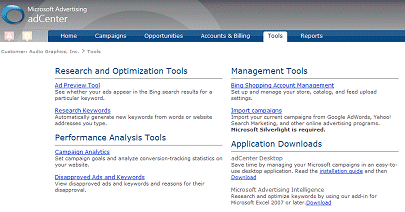 Notice how, like it's Google and Yahoo! counterparts, items for getting better use out of each campaign element are listed at MSN. (Unlike RAB's "WhyRadio" which merely points to a mass of numbers showing why you should choose radio.) All information from each online source is presented as an educational seminar to improve response when using these as ad vehicles. This is a huge difference in approach from what's offered at RAB, and a reason why we continue to see more ad dollars funneled to internet advertising. Another item of interest revolves around radio's ability to trigger online searches, as is highlighted in WhyRadio's "Radio And Other Media" section. Here's how radio is positioned in its table, prominently placed in the top slot. 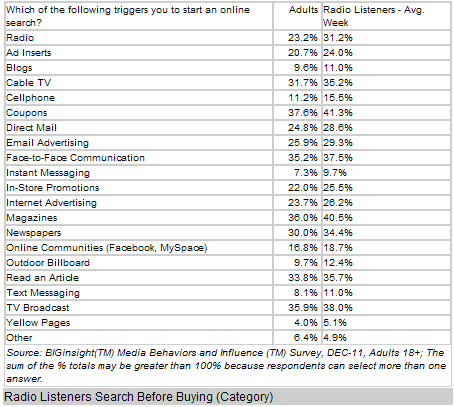 But do a sort on percentages of media that initiate an online search, and radio drops to the #11 position. Click here to see how the chart reads after this type of sort. One last point in this discussion: I'm not sure where the disconnect is on this but, when the radio industry continually says how Pandora and most other online music channels are not radio, it's counterproductive to then list all in a statement claiming online radio listening growth. 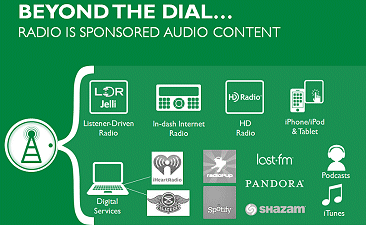  If that's the case, and if radio wants to be consistent, then it must refrain from including Pandora, LastFM, Spotify, etc, from any form of data sets that boast about the numbers of people now listening to radio online. Click the picture to expand it, and then ask yourself what size is the online radio audience if the radio industry excludes the aforementioned new competitors in its tabulation. To give you a little insight, view the top 2 tiers of online radio listening, as reported by Triton Digital Webcast Metrics. In each case, it is a pureplay that is well out in front of the broadcasters. 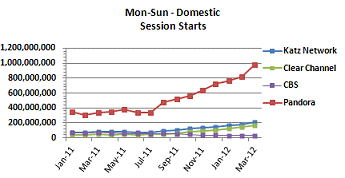 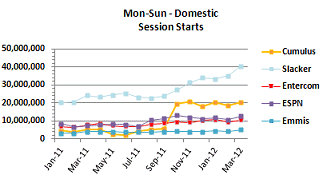 Listening to radio online is growing at a remarkable clip, but that's a claim that cannot be made if Pandora and Slacker are taken out of the picture - then, the more appropriate description to use might be that listening to radio online is showing signs of modest growth. Some in the radio industry might point to the "Radio Ad Lab" as equivelant to what's offered at Google, Yahoo!, and MSN. Especially with this statement on its home page: "The Radio Ad Lab is funded by Radio industry companies to further the understanding of how Radio advertising works, to measure Radio's effectiveness, and to increase advertiser and agency confidence in Radio." Go through the Radio Ad Lab, though, and it is evident how the approach remains to convince visitors that radio is a good media for reaching audience. Even here, there is little effort placed in helping ad agencies and advertisers better use radio as an advertising vehicle. |









